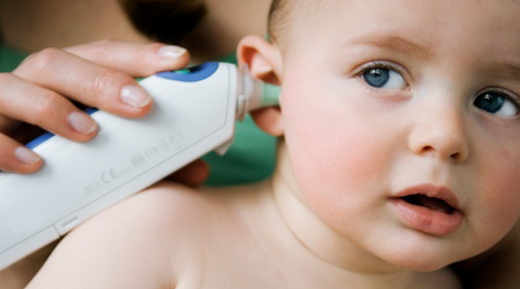
Your 5 year old has a cold that just doesn’t want to go away. She comes home from school flushed with fever and exhausted.
Your 18 month old wakes up from his nap with a fever of 39. He only wants his bottle and refuses all food.
Your 6 month old is irritable and lethargic. He vomits once and doesn’t want to play. He too has a fever.
A child with a fever is one of the most common reasons for consulting a doctor. When is it an emergency? When should you wait and watch? Awareness of some of the danger signs associated with fevers can help you, as a parent, know how to approach the illness.
Age is important: As a general rule any baby under 3 months with a fever should be assessed by a doctor the same day. Babies between 3-6 months can be given acetominophen (Tempra/Tylenol) and observed at home for up to 24 hours unless they develop one of the warning signs listed below. Children over 6 months can be given acetominophen and observed at home for up to 48 hours. If at any time you are concerned that your child is looking worse, it is always better to be safe than sorry.
The following are just some of the many warning signs of potentially very serious illness associated with fever and should be assessed urgently:
Younger children and babies:
Irritability, crying, difficulty consoling
Significant lethargy
Change in personality
Vomiting, especially when there is no diarrhea
Profuse diarrhea with or without vomiting (possible dehyration)
A rash that looks like little purple bruises
Pale, gray, or blue skin colour
Difficulty breathing or very rapid breathing
Seizure activity
Older children:
All of the above plus –
Pain with urination
Neck stiffness and/or severe headache
Confusion
Then there are those fevers that need to be assessed but not necessarily right away. Some common scenarios include:
1) Sore throats – this scares many parents who are worried about strep throat. There is no urgency to having this assessed. The majority of sore throats last one or two days then develop into symptoms of a cold with runny nose and/or cough. Colds are caused by viruses, not bacteria (such as strep), and do not respond to antibiotics. Many unnecessary courses of antibiotics can be avoided by waiting to see if cold symptoms evolve. There is no risk to your child by waiting a few days.
2) Earaches – these are very painful but are also commonly caused by viruses and often go away on their own without antibiotics. If a child is under 2 they should see their doctor sooner, but if they are over 2 they can safely be given acetominophen for pain and watched for a day or two. If the pain persists, they should be assessed by their doctor.
3) A child who has had a cold and a iingering cough then develops a fever should also be checked within a day or two.
4) Vomiting and diarrhea – unless there is concern about dehydration (see warning signs), generally kids with fever, vomiting and diarrhea can be treated at home with adequate fluids. You may want to speak to your doctor to determine your need for a visit.
Don’t judge the severity of an illness by how high the fever is. Education and experience will guide you but the bottom line is if your child looks unwell and you feel uncomfortable, listen to your instincts and see a doctor.


